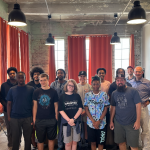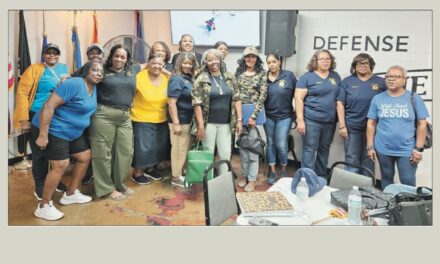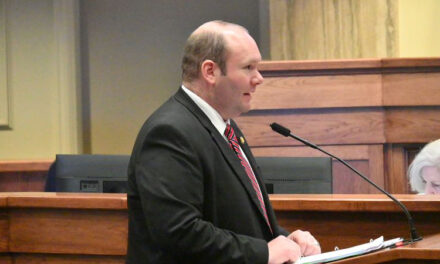By Ryan Michaels
The Birmingham Times
Two walking crutches lean against a wooden tabletop littered with pencils, permanent markers, sticky notes and drafting paper all full of sketches of arcs and cylinders alongside scribbled notes.
Joseph Drake, who graduated from Birmingham’s G.W. Carver High School in May, holds in his hands a third crutch, modified with a spring wrapped around its leg. The idea is that a retractable, spring-loaded crutch would make stairs easier for people who need the crutch.
“You could compress it, and it would lock, and you can keep it in that compressed [position] as you go upstairs…When you get done, you can simply unlock it, and it will go back to its regular height,” Drake explained.
The spring crutch design was the third of four ideas developed by Drake and his team during a two-week camp centered for recent students in Birmingham area high schools, which wrapped up Thursday.
The “MedTech Device Experience” which started on July 10 at Hardware Park in Birmingham’s Smithfield neighborhood, brought together eight Birmingham area high school students and graduates for hands-on experience in idea and prototype development for new medical products.
In addition to Carver graduate Drake, two other Birmingham City Schools students participated in the camp, including Jeremy Harper of Erskine Ramsay High School and Caren Smith of Woodlawn High School.
Additionally, Enoch Booher and Molly Elmore of Vestavia Hills High School, as well as Brooks Denson of Homewood High School, Matthew Eligwe of Hoover High School and Isaiah Williams-Scott of Fairfield’s Restoration Academy participated in the camp.
During the first week, students were split into two groups of four and were charged with developing an idea for and prototyping a new medical device which required that students thought about both marketability and practicality.
Before Drake’s group settled on improving the crutch, they thought about making a new pill box but found that many others had already worked on the product.
“There’s a bunch of different pill box options, so we went with the crutch because it hadn’t been modified for years,” Drake said.
While Drake’s group developed four different ideas for how to retract the crutch’s leg and sought to make using crutches on the stairs easier, another group of students designed an inhaler to be worn like a watch.
The idea of doing something with the inhaler came early in the process for the group, according to Isaiah Williams-Scott, who was on the watch team.
The inhaler watch design is about two inches in width, with the inhaler extended about a half-inch from the wearer’s wrist. To fit the form factor of the watch, the inhaler would have a slightly smaller capacity than a standard one but is intended to be a supplement to a regular inhaler.
Enoch Booher, who graduated from Vestavia Hills High School in May, said he and the team cut pieces of foam to play with the design of the watch.
“When we started working with foam, we were able to just really quickly try a lot of shapes, so we ended up going with one where the canister’s sort of on the edge away from you,” Booher said.
More Than A Camp
Mark Conner, executive director of Hardware Park and former director of engineering at Ramsay High School, helped lead the students, alongside Lloyd Cooper, principal of Birmingham-based Push Product Design, and Derrick Austin, director of innovation at Hardware Park.
Cooper said it can be very “frustrating” when students don’t get hands-on experience of product design until second and third years of college. The camp seeks to get that experience to students even earlier than college.
“There’s a real yearning to be able to take your skills and apply them to tangible problems,” Cooper said.
When assembling the camp, Conner said, the team intentionally combined students from Birmingham and suburban school districts.
“There are a lot of students in Birmingham who don’t know students Over The Mountain or other places. There are parts of Birmingham they’ve never been to and vice versa. We can’t address all of Birmingham’s problems, but in a small context, we can put people together that wouldn’t naturally be together,” Conner said.
After a slow start Booher said the student “got more and more efficient, and were able to function better.”
Caren Smith, who will be a senior at Woodlawn in the fall and worked on the crutches, said each student brought a different specialized skill or talent to the project.
“We all have different things that we’re good at. One of my teammates was good with 3D printing. Another one, was good with mechanics, and another with coding, so they all bring their own things to the table,” said Smith, who pointed to problem solving as her strength.
Williams-Scott, who recently started working at a pizza place near Railroad Park, said the camp brought another benefit for him: social skills.
“If I’m being honest … I don’t like talking to people,” he said. “I recently started working in a job where I’ve got to talk to people a lot, so working, it wasn’t as hard as I thought it would be. The first day [at Hardware Park], I actually started talking to my group mates, and that was surprising because, usually, it takes me a little longer before I can talk to people comfortably,” Williams-Scott said.
During the second week of the camp, students devoted their time to a variety of passion projects.
For example, Smith, who has been in the band for three years at Woodlawn, lost the screw for her drum major mace. In the second week, she set about making one and ensuring that the weight of the mace remains in balance.
During the two-week camp, Smith said she was excited to find new opportunities, like using a drill press for the first time. “I’m definitely trying new things that I never would think I would try, so it’s pretty cool,” Smith said. “I like it.”











